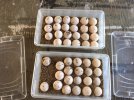I recently moved into a new property and within a week my female sulcata dug her first hole and laid 30+ eggs. Unfortunately she did brake about 8 of her eggs and egg yoke and dirt was clumped all around the other good eggs. She is fairly young and still getting the hang of egg laying.
I wasn’t too sure what the best practice is with cleaning up eggs since I am still new to breeding tortoises.
Any recommendations on properly cleaning the eggs without any harm before incubation?
I am using a C Serpents incubator FYI.
Thank You!
I wasn’t too sure what the best practice is with cleaning up eggs since I am still new to breeding tortoises.
Any recommendations on properly cleaning the eggs without any harm before incubation?
I am using a C Serpents incubator FYI.
Thank You!

